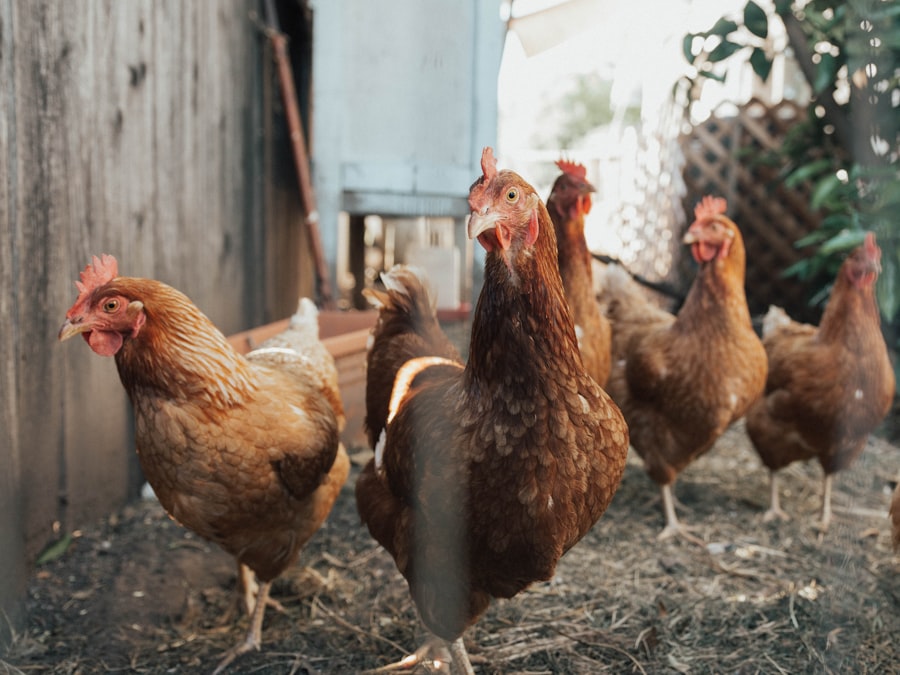Chicken feed is a critical component in the production of high-quality eggs. The nutritional composition of the feed directly affects the health and productivity of laying hens. Proper nutrition is vital for ensuring that hens produce eggs with strong shells, vibrant yolks, and optimal nutritional content.
This article will examine the importance of adequate nutrition for egg-laying hens, common ingredients found in chicken feed, factors influencing egg production, indicators of nutritional deficiencies in hens, and methods for enhancing egg production through improved nutrition. Egg production is a complex physiological process that requires a balanced diet to support the health and well-being of hens. The quality of the feed directly influences the quality of the eggs produced.
Consequently, it is crucial for poultry farmers to comprehend the nutritional requirements of their hens and provide them with a well-balanced diet to optimize egg production. By understanding the role of chicken feed in egg production, farmers can make informed decisions regarding the type and quality of feed they offer to their hens, ultimately leading to improved egg production and increased profitability.
Table of Contents
- 1 The Importance of Proper Nutrition for Egg-Laying Hens
- 2 Common Ingredients in Chicken Feed and Their Impact on Egg Production
- 3 Factors Affecting Egg Production in Chickens
- 4 Signs of Nutritional Deficiency in Egg-Laying Hens
- 5 Strategies for Improving Egg Production Through Nutrition
- 6 The Role of Chicken Feed in Maximizing Egg Production
- 7 FAQs
Key Takeaways
- Proper nutrition is essential for maximizing egg production in hens.
- Common ingredients in chicken feed, such as protein and calcium, have a significant impact on egg production.
- Factors affecting egg production in chickens include age, breed, and environmental conditions.
- Nutritional deficiencies in hens can lead to decreased egg production and poor egg quality.
- Strategies for improving egg production through nutrition include providing a balanced diet and access to clean water.
The Importance of Proper Nutrition for Egg-Laying Hens
The Importance of Meeting Nutritional Requirements
Therefore, it is crucial for poultry farmers to understand the specific nutritional requirements of their hens and provide them with a diet that meets those needs. In addition to supporting egg production, proper nutrition also plays a vital role in the overall health and well-being of the hens.
A Diet Rich in Essential Nutrients
A diet that is rich in essential nutrients such as protein, vitamins, and minerals helps to support the immune system, promote healthy growth, and maintain strong bones and feathers.
Benefits of a Well-Balanced Diet
By providing hens with a well-balanced diet, farmers can ensure that their flock remains healthy and productive, ultimately leading to higher egg production and better overall profitability.
Common Ingredients in Chicken Feed and Their Impact on Egg Production

Chicken feed is formulated using a variety of ingredients that provide the essential nutrients needed for egg-laying hens. Common ingredients in chicken feed include grains such as corn, wheat, and barley, as well as protein sources like soybean meal and fish meal. These ingredients provide hens with the necessary energy, protein, and other nutrients needed for optimal egg production.
Grains are an important source of energy for hens and help to support their daily activities as well as egg production. Protein sources such as soybean meal and fish meal are essential for supporting muscle development and egg formation. In addition to grains and protein sources, chicken feed also contains vitamins and minerals such as calcium, phosphorus, and vitamin D, which are crucial for supporting strong bones and eggshell formation.
By providing hens with a well-balanced diet that includes these essential ingredients, farmers can ensure that their hens have the necessary nutrients to produce high-quality eggs.
Factors Affecting Egg Production in Chickens
Several factors can impact egg production in chickens, including genetics, age, environmental conditions, and nutrition. Genetics play a significant role in determining the potential egg-laying capacity of hens. Certain breeds are known for their high egg production, while others may not be as prolific layers.
Age also plays a role in egg production, with younger hens typically laying more eggs than older hens. Environmental conditions such as temperature, lighting, and housing can also impact egg production. Hens require specific environmental conditions to lay eggs consistently.
For example, changes in daylight length can trigger or inhibit egg production. Nutrition is another critical factor that can affect egg production. Hens require a well-balanced diet to support their reproductive functions and produce high-quality eggs.
By understanding these factors and making appropriate adjustments, poultry farmers can optimize egg production in their flocks.
Signs of Nutritional Deficiency in Egg-Laying Hens
Nutritional deficiencies can have a significant impact on the health and productivity of egg-laying hens. Common signs of nutritional deficiency in hens include decreased egg production, poor egg quality, feather loss, weight loss, and overall poor health. For example, a lack of calcium in the diet can lead to thin or soft-shelled eggs, while a deficiency in protein can result in reduced muscle development and poor egg production.
It is essential for poultry farmers to monitor their hens for signs of nutritional deficiency and make adjustments to their diet as needed. By providing hens with a well-balanced diet that meets their specific nutritional needs, farmers can ensure that their flock remains healthy and productive, ultimately leading to better egg production and overall profitability.
Strategies for Improving Egg Production Through Nutrition

Providing a Well-Balanced Diet
Poultry farmers can improve egg production by providing hens with a well-balanced diet that meets their specific nutritional needs. This may involve working with a poultry nutritionist to formulate a custom feed blend that provides the necessary nutrients for optimal egg production.
Supplementing the Hens’ Diet
Another strategy is to supplement the hens’ diet with additional nutrients as needed. For example, providing calcium supplements can help support strong eggshell formation, while adding protein supplements can support muscle development and egg production. Additionally, ensuring that hens have access to clean water at all times is essential for supporting their overall health and productivity.
Monitoring and Adjusting
Monitoring the hens’ body condition and egg production can help farmers identify any potential nutritional deficiencies and make adjustments to their diet accordingly. By implementing these strategies, poultry farmers can improve the overall nutrition of their hens and ultimately maximize egg production.
The Role of Chicken Feed in Maximizing Egg Production
In conclusion, chicken feed plays a crucial role in maximizing egg production in hens. Proper nutrition is essential for supporting the health and productivity of egg-laying hens, as well as ensuring the production of high-quality eggs. By understanding the specific nutritional needs of their hens and providing them with a well-balanced diet that meets those needs, poultry farmers can optimize egg production in their flocks.
Common ingredients in chicken feed such as grains, protein sources, vitamins, and minerals provide hens with the essential nutrients needed for optimal egg production. Factors such as genetics, age, environmental conditions, and nutrition can impact egg production in chickens. It is essential for poultry farmers to monitor their hens for signs of nutritional deficiency and make adjustments to their diet as needed.
By implementing strategies such as providing a well-balanced diet, supplementing with additional nutrients as needed, and monitoring the hens’ body condition and egg production, farmers can improve the overall nutrition of their hens and ultimately maximize egg production. Overall, proper nutrition through chicken feed is essential for supporting the health and productivity of egg-laying hens and ensuring the production of high-quality eggs.
If you’re having trouble with your chickens laying eggs, it could be related to their feed. According to a recent article on Poultry Wizard, the type of feed you give your chickens can have a big impact on their egg production. To learn more about how to optimize your chicken’s diet for egg laying, check out this article.
FAQs
What is chicken feed?
Chicken feed is a specially formulated food for chickens that provides them with the necessary nutrients, vitamins, and minerals to support their growth, health, and egg production.
What are the common ingredients in chicken feed?
Common ingredients in chicken feed include grains such as corn, wheat, and barley, as well as protein sources like soybean meal and fish meal. It also contains vitamins, minerals, and sometimes additives like probiotics and herbs.
Can chicken feed affect egg production?
Yes, the quality and composition of chicken feed can affect egg production. A lack of essential nutrients or imbalanced feed can lead to decreased egg production or poor egg quality.
How can chicken feed impact egg laying?
Chicken feed that is low in protein, calcium, or other essential nutrients can negatively impact egg laying. Additionally, stress or illness caused by poor feed can also lead to a decrease in egg production.
What can be done to improve egg production through chicken feed?
Ensuring that chickens are provided with a balanced and nutritious feed, as well as access to clean water, can help improve egg production. It’s also important to monitor the health and behavior of the chickens to identify any potential issues with their feed.
Meet Walter, the feathered-friend fanatic of Florida! Nestled in the sunshine state, Walter struts through life with his feathered companions, clucking his way to happiness. With a coop that’s fancier than a five-star hotel, he’s the Don Juan of the chicken world. When he’s not teaching his hens to do the cha-cha, you’ll find him in a heated debate with his prized rooster, Sir Clucks-a-Lot. Walter’s poultry passion is no yolk; he’s the sunny-side-up guy you never knew you needed in your flock of friends!







